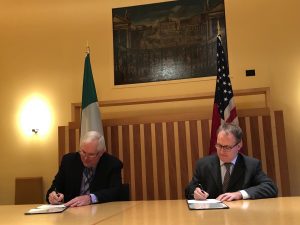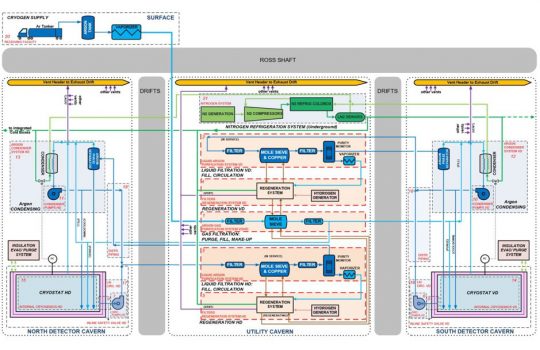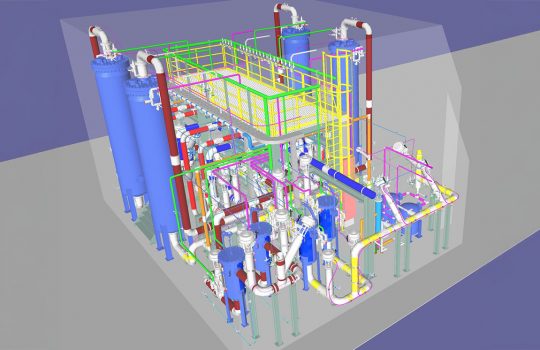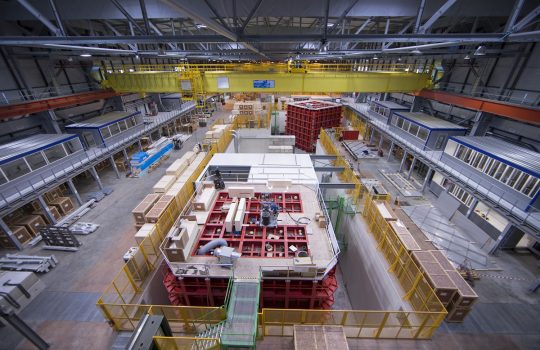Note: A shortened version of this release was issued earlier today by the U.S. Department of Energy.

Jim Siegrist, associate director of the DOE Office of High-Energy Physics, and Maurizio Greganti, deputy chief of mission for the Embassy of Italy to the United States, sign an agreement to collaborate on Fermilab’s PIP-II project.
Today the U.S. Department of Energy (DOE) and Italy’s Ministry of Education, Universities and Research (MIUR) signed an agreement to collaborate on the development and production of technical components for PIP-II, a major U.S. particle accelerator project to be located at DOE’s Fermi National Accelerator Laboratory in Batavia, Illinois. The signing took place at the Embassy of Italy in Washington.
Italy and its National Institute of Nuclear Physics (INFN) will provide major contributions to the construction of the 176-meter-long superconducting particle accelerator that is the centerpiece of the PIP-II (Proton Improvement Plan-II) project. The new accelerator will become the heart of the Fermilab accelerator complex and provide the proton beam to power a broad program of accelerator-based particle physics research for many decades to come. In particular, PIP-II will enable the world’s most powerful high-energy neutrino beam to power the international Fermilab-hosted Deep Underground Neutrino Experiment (DUNE).
“It is with great appreciation that the Department of Energy enters into this agreement with our partners at MIUR and INFN,” said DOE Undersecretary for Science Paul Dabbar. “We’re proud that Fermilab’s PIP-II accelerator project, designed to create one of the most advanced machines for enabling discovery in the United States, is attracting major contributions from international partners for its construction.”
The INFN Laboratory for Accelerators and Applied Superconductivity is expected to build components for the PIP-II accelerator. Based in Segrate, Italy, the laboratory is a center of excellence on an international scale for the development of advanced particle accelerators technologies.
“The Agreement signed today by the Italian Ministry of Education, Universities and Research and DOE is the latest example of the scope and breadth of the scientific and technological cooperation between our two countries and of the importance of international cooperation,” said Armando Varricchio, ambassador of Italy to the United States. “This new step in our cooperation comes at a very significant time as we celebrate the 30th anniversary of the U.S.-Italy Agreement on Scientific and Technological Cooperation and renew our bilateral projects portfolio for the next three years.”
At the signing, representatives from both countries recognized the long tradition of collaboration between Italian scientists and Fermilab, named after Italy’s own Enrico Fermi.
“Following a long tradition of collaboration, the engagement of INFN on the construction of the PIP-II accelerator constitutes an important step in the context of unraveling neutrino properties through the ambitious DUNE project,” said INFN President Fernando Ferroni.
The centerpiece of the PIP-II project will be an 800-million-electronvolt superconducting linear accelerator, which will modernize the front end of the existing Fermilab accelerator chain and provide a platform for future enhancements. The new accelerator will feature acceleration cavities made of niobium and double the beam energy of its predecessor. Such a boost will enable the Fermilab accelerator complex to achieve megawatt-scale proton beam power.
“Our Italian partners are critical to the successful completion of Fermilab’s PIP-II superconducting accelerator,” said PIP-II Project Director Lia Merminga of Fermilab. “It takes a global community to build advanced, state-of-the-art accelerators like the one we’re developing for PIP-II.”
In addition to Italy, other international partners are making significant contributions to PIP-II. They include India, the United Kingdom, and France. DOE’s Argonne and Lawrence Berkeley National Laboratories are also contributing key components to the project.
“At the INFN Laboratory for Accelerators and Applied Superconductivity, we have a great experience of fruitful collaboration with Fermilab on advanced technologies for superconducting particle accelerators,” said Carlo Pagani of the University of Milan, Italian PIP-II project manager. “We are colleagues and friends, and I am excited for the opportunity that PIP-II is giving both for further growing together.”
The partnership is one example of the increasingly global character of particle physics-related projects. The PIP-II accelerator complex will be made available to the international particle physics community and will extend the scientific discovery potential beyond that which currently can be reached.
“It’s exciting to think that, in just a few years, the new PIP-II accelerator will produce some of the world’s most intense neutrino beams, which could give us a clearer picture of our universe’s evolution,” said Fermilab Director Nigel Lockyer. “This bright future is thanks in large part to our Italian partners. And since these partnerships strengthen over time, we could very well build on the relationship for future exciting projects in fundamental science.”
This 40-second animation provides an overview of the PIP-II project. To learn more, visit pip2.fnal.gov.
Fermilab is America’s premier national laboratory for particle physics and accelerator research. A U.S. Department of Energy Office of Science laboratory, Fermilab is located near Chicago, Illinois, and operated under contract by the Fermi Research Alliance LLC, a joint partnership between the University of Chicago and the Universities Research Association, Inc. Visit Fermilab’s website at www.fnal.gov and follow us on Twitter at @Fermilab.
The DOE Office of Science is the single largest supporter of basic research in the physical sciences in the United States and is working to address some of the most pressing challenges of our time. For more information, please visit science.energy.gov.
INFN, Istituto Nazionale di Fisica Nucleare, is the public Italian research institute dedicated to the study of the fundamental constituents of matter and their interactions. INFN conducts theoretical and experimental research in the fields of subnuclear, nuclear and astroparticle physics. Fundamental research in these areas requires the use of cutting-edge technology and instruments, developed by the INFN at its own laboratories and in collaboration with industries. All of the INFN’s research activities are conducted in close collaboration with Italian universities and undertaken within an international framework.



